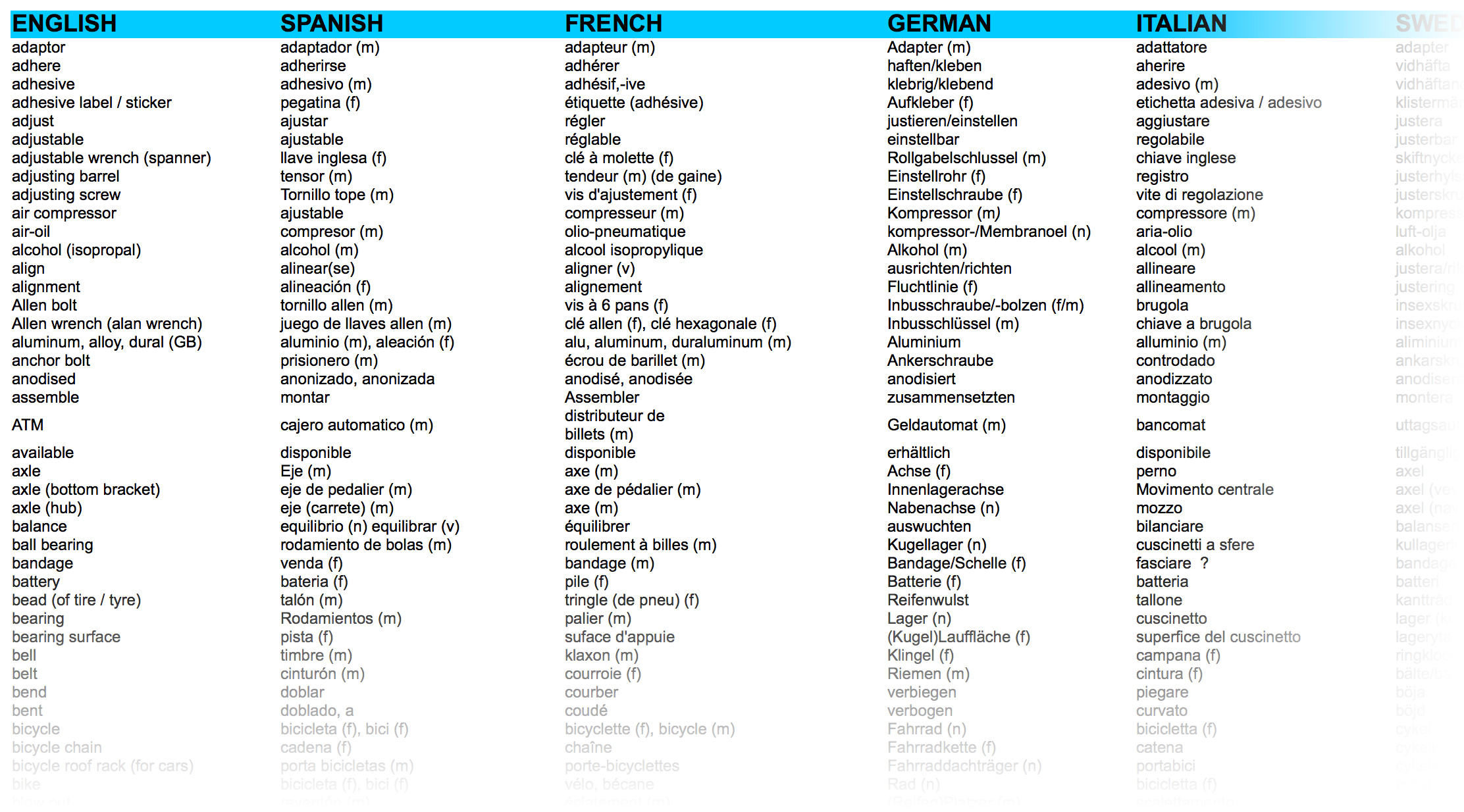Bicycle Mechanic Language Spreadsheet
This article links to a comprehensive spreadsheet of terms commonly used by bicycle mechanics, in order to help the traveling bicycle mechanic communicate more effectively.
About the Spreadsheet
The most recent addition of the database is Serbian, as of March 26, 2008. Thank you all who have helped expand this tool and provide feedback. I hope you find it useful. Download: Bicycle Mechanic Language Spreadsheet
In my line of work it has been necessary to travel to various countries. I am able to get along in several languages, speaking “bicycle talk” in German, Spanish, and French. There have been moments I have needed a specific term to help my work, and I just didn’t have it. This resulted in drawing pictures, waving hands, grabbing passersby for English-to-German-to-Italian, and then Italian-to-German-to-English translation. Turns out the place did have DOT 4 fluid after all.
Fortunately, fixing bicycles does not require discussing of the subtleties of Hegel, Cervantes, or Sartre. There are a limited number of words a person needs to get along in this environment. It is useful to know your bicycle component terms, but you can always just bring along the part in question. A few adjectives are useful, such as good, bad, and broken. Try to know your numbers, but these can simply be written down when necessary. It certainly helps to know a few simple phrases. However, I would recommend you simply begin discussions in your native tongue. The person you are trying to communicate with may understand, and this can help prevent you from looking too ridiculous as you lay waste to the local pronunciations. Still, I have found that reaching out and trying to communicate in the local tongue is appreciated.
For example, it is useful to know a few things, such as:
Can you help me? In Marseille, France: “Pouvez-vous m’aider?“
I am hungry. In Palma de Mallorca, Spain: “Tengo hambre.“
Where is a bicycle store? In Lugnao, Switzerland: “Dove c’è un negozio di biciclette?”
In order to help the new mechanics traveling for work, and to help myself, I have put together a spreadsheet of terms useful to mechanics. The result is the Bicycle Mechanic Languages Version 5.1. It is available here as a free download. It contains about 450 terms in English, Spanish, French, German, Italian, Swedish, Portuguese, Dutch and Serbian. There are tabs for part names, numbers, phrases, and instructions for use. English is loaded as the first column, with words in alphabetical order according to English. The user may select the entire table and sort alphabetically by other languages. To do this, look in the menu bar under “Data”. Select “Sort” and select the column head desired. Click OK to sort.
NOTE: Please remember this information is only intended to supplement your knowledge of a second language. It provides no pronunciation or syntax.
Click to download the form as an Excel® file: Bicycle Mechanic Language Spreadsheet (current as of August 25, 2015).
You will need a program capable of handling Excel® files.
The table will look something like the image below. The complete table is very long, and does not make for clean web page, so I recommend you download the data as the Excel® file.

Be assured that there are errors and omissions in this document. There are some holes for terms in some languages. Feedback from the field is appreciated. However, please be patient and explain clearly why you suggest a change. It is necessary to double check changes, and this is a volunteer project. It will take some time to post new versions. The spreadsheet includes instructions for feedback.
I remember working for the US Team as a young mechanic at European stage races. Race mechanics tend to hang together, and I made friends with a mechanic from the Czechoslovakian team. This was before the fall of the Soviet empire and there was huge pressure to “beat the Soviets”, or in this case, whomever was a satellite. I could speak no Czech, and he spoke no English, but we got along in German. We traded tools as a sign of friendship. I often wonder what became of him. Back then I was perhaps naive in thinking sports could help world peace, but part of me still clings to that hope. That hope is what drives this spreadsheet.
There have been several people involved in the development of this project. I would like to thank them and recognize for their efforts:
- Sheldon Brown of Harris Cycle
- Miguel Saez Brieba of Zaragoza, Spain
- Chris Clinton of promechanics.com
- Scott Daubert of Trek®
- Francis Kelsell of Mallon Sarl, France
- Jean-Pierre Busti of Marseille, France
- Dr. Colin Howat III of KU, Lawrence, Kansas
- Simone Roncale of Campagnolo®
- Vincent Gee of Discovery® Professional Cycling Team
- Thomas Flegel, Germany
- Luca Cedroni of Vittoria®, Italy
- Claudio at FSA Europe
- Jon Lindgren and Nick Beaumont- Sweden
- Jose Henrique de Oliveira Vieira- Brazil
- Gerard Epke - Nederland
- Igor Nešovic - Novi Sad. Serbia
- Pedro Alexandre Capelinha